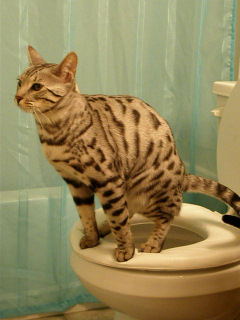Just how do you actually feel in regards to Can You Flush Cat Poop Down The Toilet??

Intro
As feline proprietors, it's necessary to be mindful of how we dispose of our feline good friends' waste. While it might seem practical to purge feline poop down the toilet, this method can have damaging consequences for both the environment and human wellness.
Ecological Impact
Purging feline poop presents harmful microorganisms and bloodsuckers right into the water system, presenting a significant danger to water environments. These contaminants can negatively impact marine life and compromise water quality.
Wellness Risks
In addition to ecological problems, flushing pet cat waste can likewise present health and wellness dangers to people. Cat feces might have Toxoplasma gondii, a parasite that can cause toxoplasmosis-- a possibly serious ailment, specifically for expecting females and people with weakened immune systems.
Alternatives to Flushing
Fortunately, there are safer and extra responsible means to take care of feline poop. Consider the following choices:
1. Scoop and Dispose in Trash
One of the most common technique of taking care of feline poop is to scoop it right into an eco-friendly bag and throw it in the trash. Make certain to make use of a devoted trash inside story and deal with the waste promptly.
2. Usage Biodegradable Litter
Go with biodegradable pet cat litter made from products such as corn or wheat. These clutters are environmentally friendly and can be safely gotten rid of in the trash.
3. Bury in the Yard
If you have a yard, take into consideration hiding pet cat waste in a designated area far from veggie yards and water resources. Be sure to dig deep sufficient to avoid contamination of groundwater.
4. Mount a Pet Waste Disposal System
Invest in a pet waste disposal system specifically designed for pet cat waste. These systems use enzymes to break down the waste, decreasing odor and environmental influence.
Conclusion
Responsible animal possession prolongs beyond giving food and sanctuary-- it additionally involves appropriate waste management. By avoiding flushing pet cat poop down the bathroom and going with alternative disposal methods, we can lessen our environmental footprint and secure human wellness.
Why Can’t I Flush Cat Poop?
It Spreads a Parasite
Cats are frequently infected with a parasite called toxoplasma gondii. The parasite causes an infection called toxoplasmosis. It is usually harmless to cats. The parasite only uses cat poop as a host for its eggs. Otherwise, the cat’s immune system usually keeps the infection at low enough levels to maintain its own health. But it does not stop the develop of eggs. These eggs are tiny and surprisingly tough. They may survive for a year before they begin to grow. But that’s the problem.
Our wastewater system is not designed to deal with toxoplasmosis eggs. Instead, most eggs will flush from your toilet into sewers and wastewater management plants. After the sewage is treated for many other harmful things in it, it is typically released into local rivers, lakes, or oceans. Here, the toxoplasmosis eggs can find new hosts, including starfish, crabs, otters, and many other wildlife. For many, this is a significant risk to their health. Toxoplasmosis can also end up infecting water sources that are important for agriculture, which means our deer, pigs, and sheep can get infected too.
Is There Risk to Humans?
There can be a risk to human life from flushing cat poop down the toilet. If you do so, the parasites from your cat’s poop can end up in shellfish, game animals, or livestock. If this meat is then served raw or undercooked, the people who eat it can get sick.
In fact, according to the CDC, 40 million people in the United States are infected with toxoplasma gondii. They get it from exposure to infected seafood, or from some kind of cat poop contamination, like drinking from a stream that is contaminated or touching anything that has come into contact with cat poop. That includes just cleaning a cat litter box.
Most people who get infected with these parasites will not develop any symptoms. However, for pregnant women or for those with compromised immune systems, the parasite can cause severe health problems.
How to Handle Cat Poop
The best way to handle cat poop is actually to clean the box more often. The eggs that the parasite sheds will not become active until one to five days after the cat poops. That means that if you clean daily, you’re much less likely to come into direct contact with infectious eggs.
That said, always dispose of cat poop in the garbage and not down the toilet. Wash your hands before and after you clean the litter box, and bring the bag of poop right outside to your garbage bins.
https://trenchlesssolutionsusa.com/why-cant-i-flush-cat-poop/

I ran across that review about How to Dispose of Cat Poop and Litter Without Plastic Bags while doing a search on the internet. Sharing is good. One never knows, you will be doing someone a favor. Thanks for taking the time to read it.
Call Us Now